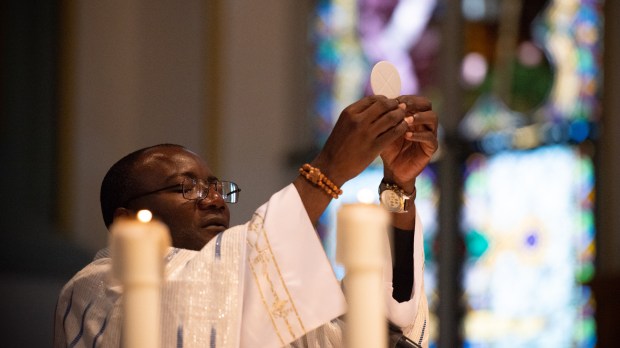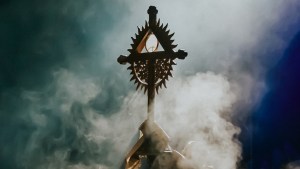Jesus didn’t leave us with a movie of himself. He left us something better.
As Lent crescendos toward its climax, Catholic families are starting to think of the best ways to help their children experience the story of our faith. Many of us will turn to movies to do so. But it’s important to remember that Jesus left something even better: the Eucharist.
One shortcoming of movies: They crowd other images from your mind.
When I was a kid I remember watching Franco Zefferelli’s Jesus of Nazareth on NBC. To this day I picture Jesus as looking like Robert Powell, and I picture John the Baptist looking like Michael York. The Peter in my mind is that movie’s Peter and its Judas is my Judas.
There’s a reason for that. A Washington University psychological study found that movies about history supplant the book-learning we do about history. Whatever we know about an event, our brains know what to do with what we see unfold before our eyes: believe it, implicitly.
Jesus of Nazareth gives a fine depiction of Jesus, but I think it’s unfortunate that it has hijacked my imagination. Other movies haven’t done this. I don’t think of Jesus as looking like Jim Caviezel, exactly, maybe because I watched The Passion of the Christ (2004) later in life.
I love Jonathan Roumie as Jesus in the series The Chosen — he has just the right combination of seriousness and joy, gentleness and firmness. But I do worry that its presentation of the backstory of the apostles and characterization of Matthew, for instance, are so specific that they will become my children’s understanding of who these people are.
That’s why my family (mostly) watches two movies about Jesus each year.
The film The Miracle Maker (2000) stars the voice of Ralph Fiennes as Jesus but is less likely to crowd other images of Jesus out, because it uses puppets instead of actors. The stylized puppets are made by Russian artists and draw more from the iconographic tradition of the East than from the realism of the sacred art of the West.
Our family also watches Ben Hur (1959) each Good Friday, which is a brilliant cinematic presentation of Jesus. Not only does it never show his face, leaving your imagination intact — it never shows the faces of his apostles, either. And even though it makes a profound point about the power of the crucifixion, it never shows any Biblical figure at any length except Pilate and Balthasar, one of the magi.
But that’s fine, because we have something better than a movie: the Eucharist.
The fact is, Jesus died and rose 2,000 years ago, and he’s not going to die and rise again. But he did leave a way for us to be there at that one event that is over and done with — the Mass.
“Christ’s sacrifice present on the altar makes it possible for all generations of Christians to be united with his offering,” says the Catechism. While all other historical events are “swallowed up by the past” the Passion of Christ is not, it adds. In the Mass, Jesus “transcends all times while being made present in them all.”
That means that going to Mass means we actually spend time with Jesus as he offers himself at the Last Supper, then dies and rises for us.
That makes Mass better than a movie.
Think of the differences between movies and the Eucharist:
- Movies depict events realistically, but movies aren’t real; the Mass depicts events symbolically, but they are real. “The sacraments confer the grace that they signify,” the Catechism says, “because in them Christ himself is at work.”
- Movies unintentionally hijack your imagination, asserting themselves on your brain as “the way things were;” the Eucharist enchants your imagination, helping you see the divine purpose in the ordinary way things are.
- Movies emphasize Jesus as a figure locked in the past; the Eucharist emphasizes Jesus as a continuing Presence, recalling his past activity to empower our future action.
The Passion of the Christ depicts this well. By intercutting between Jesus at the Last Supper and Jesus at the cross, the film shows how the two actions merge into one.
They did so on that night 2,000 years ago, and this Sunday in every Catholic parish.


